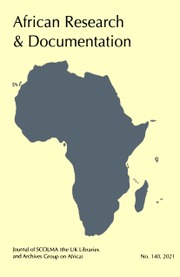No CrossRef data available.
Article contents
IV. Access to—and impact of—book reviews
Published online by Cambridge University Press: 25 April 2022
Extract
The authors of the set of essays on various aspects of reviewing recently published in ARD (no. 102 [2007]:13-35) argue en ensemble that reviews continue to fill a function in scholarly communications—an unofficial system of checks and balances that can and often does set limits on how cases are presented to the public. I am less convinced of this than the authors, at least as to their value in the library acquisitions process. At any rate, the greater their value, the greater the need to optimize the production and reception by launching a number of reforms that would have the effect of providing this argument with grounds that could make it even stronger.
Book reviews have long been touted as a means to influence institutional purchasing, not only of scholarly books but of all books. Focusing on the former, it strikes me that this could never have been much the case.
- Type
- Articles
- Information
- Copyright
- Copyright © International African Institute 2007




